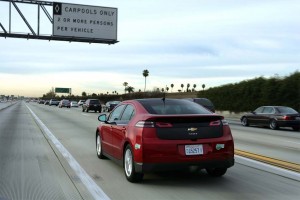Sales of the Chevrolet Volt are expected to post a whopping gain when final figures for 2012 are released today – but despite setting a new sales record for plug-in hybrid technology the Volt still fell short of General Motors’ initial expectations.
Volt sales were up 239% through November to 20,858 and Chevrolet dealers are expected to have delivered at least 1,500 more of the extended-range electric vehicle in December, raising total sales for the year to more than 23,000 in the U.S. That doesn’t include variations of the Volt delivered in Europe or China.
Despite the gain, Volt sales remain substantially below GM’s expectations. The Detroit maker initially had hoped to sell more than 40,000 Volts in the U.S. alone in 2012 but backed off that estimate several months ago after twice temporarily idling the Chevy plug-in’s assembly line.
In 2011 GM, sold 7,671 Volts undershooting its target of 10,000 units.
Despite missing targets, GM officials continue to defend the Volt and note that demand has surged since mid-year when a new P-ZEV — or Partial-Zero Emissions Vehicle – version was introduced that led California to grant solo drivers access to carpool lanes even as the state lifted the carpool lane privileges of the Toyota Prius.
GM is by no means the only maker struggling to meet earlier, optimistic targets for advanced battery vehicles. Last fall, Nissan Motor Co. which has also made a broad commitment to electric propulsion, admitted the automaker will not meet its sales target for the all-electric Leaf.
But like GM, Nissan continues to be optimistic about the future. The Japanese maker has just opened both a new battery plant and a Leaf assembly line at its sprawling manufacturing complex in Smyrna, Tennessee. The first saleable Nissan Leaf will roll off the line there later this month.
Tom Libby, R.L. Polk’s lead analyst for North America, said sales of vehicles with alternative powertrains, such as hybrids and EVs, are expected to grow again this year but at a moderate pace.
“While the number of available hybrid models in the U.S. will increase this year, Polk anticipates only a slight improvement in this category from its current level of approximately 2.9% of the overall market,” said Libby, as part of a new study that sees an overall surge in U.S. auto sales to 15.3 million this year.
“Reasons for this include the continued significant price differential between hybrids and traditionally-powered vehicles, and the high number of traditionally-powered vehicles that achieve similar mileage targets as those in the hybrid segment,” he explained.

